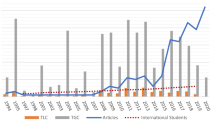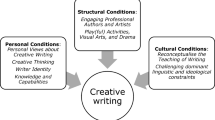Abstract
This study investigated the extent to which preschool teachers and children (ages 4–6) used literal and inferential language within the context of whole-group instruction in four kindergarten classrooms in Hong Kong. A total of 20 sessions of videotaped classroom observations of linguistic interactions between teachers and children were transcribed and then analyzed using a coding scheme to determine the cognitive complexity of teacher questions and child responses with reference to four levels of abstraction, representing a literal-to-inferential continuum. The results indicated that the teachers’ questions were predominantly literal in nature (83 %), and similarly the majority of the children’s responses (77 %) were also literal. Furthermore, it was revealed that in an average instructional session: (a) teachers produced significantly more utterances than children; (b) the difference in the quantity of teachers’ questions between literal and inferential levels was statistically significant; (c) similarly, the difference in the quantity of children’s responses between literal and inferential levels was also statistically significant; and (d) children produced a significantly larger quantity of shorter than longer utterances. As there is distinct value in whole-group instruction as a salient context for teacher–child interactive, linguistic engagement in kindergarten classrooms in Hong Kong, it is particularly vital that early childhood educators understand what types of linguistic interactions are occurring there and how to target professional development for teachers to better support language learning in young children.

Similar content being viewed by others
Notes
Kindergarten in Hong Kong can be considered as equivalent to preschool in the United States.
We calculated the length of child utterances in terms of the number of words rather than morphemes (as did U.S. studies) because unlike English, Chinese is a non-alphabetic language.
References
2011 Population Census Office. Population aged 5 and over by usual language, 2001, 2006 and 2011. Census and Statistics Department, the Government of the Hong Kong Special Administrative Region. Retrieved from http://www.census2011.gov.hk/en/main-table/A107.html.
Audit Commission. (2013). Pre-primary education voucher scheme (Director of Audit Report No. 60). Hong Kong: Hong Kong Audit Commission.
Blank, M., Rose, S. A., & Berlin, L. J. (1978). The language of learning: The preschool years. New York: Grune & Stratton.
Bronfenbrenner, U. (1979). The ecology of human development: Experiments by nature and design. Cambridge, MA: Harvard University Press.
Bronfenbrenner, U., & Morris, P. A. (1998). The ecology of developmental processes. In W. Damon & R. M. Lerner (Eds.), Handbook of child psychology (5th ed., pp. 993–1028). New York: Wiley.
Chapman, R. (2000). Children’s language learning: An interactionist perspective. Journal of Child Psychology and Psychiatry, 41(1), 33–54.
Chen, J. J., & de Groot Kim, S. (2014). The quality of teachers’ interactive conversations with preschool children from low-income families during small-group and large-group activities. Early Years: An International Research Journal, 34(3), 271–288.
Chen, J. J., Li, H., & Wang, J. (2017). Implementing the project approach: A case study of hybrid pedagogy in a Hong Kong kindergarten. Journal of Research in Childhood Education, 31(2) (in press).
de Rivera, C., Girolametto, L., Greenberg, J., & Weitzman, E. (2005). Children’s responses to educators’ questions in day care play groups. American Journal of Speech-Language Pathology, 14(1), 14–26.
Dickinson, D. K. (2006). Toward a toolkit approach to describing classroom quality. Early Education and Development, 17(1), 177–202.
Education Bureau, the Government of the Hong Kong Special Administrative Region (2015). Overview of kindergarten education in Hong Kong. Retrieved from http://www.edb.gov.hk/en/edu-system/preprimary-kindergarten/overview/index.html.
Girolametto, L., & Weitzman, E. (2002). Responsiveness of child care providers in interactions with toddlers and preschoolers. Language, Speech, and Hearing Services in Schools, 33(4), 268–281.
Girolametto, L., Weitzman, E., van Lieshout, R., & Duff, D. (2000). Directiveness in teachers' language input to toddlers and preschoolers in day care. Journal of Speech, Language, and Hearing Research, 43(5), 1101–1114.
Halliday, M. A. K. (2004). The place of dialogue in children’s construction of meaning. In R. B. Ruddell & N. J. Unrau (Eds.), Theoretical models and processes of reading (5th ed., pp. 133–145). Newark, DE: International Reading Association.
Hammett, L. A., van Kleeck, A., & Huberty, C. J. (2003). Patterns of parents’ extratextual interactions during book sharing with preschool children: A cluster analysis study. Reading Research Quarterly, 38(4), 442–468.
Hindman, A. H., Connor, C. M., Jewkes, A. M., & Morrison, F. J. (2008). Untangling the effects of shared book reading: Multiple factors and their associations with preschool literacy outcomes. Early Childhood Research Quarterly, 23(3), 330–350.
Hong Kong Curriculum Development Council (Education Department). (2006). Guide to the pre-primary curriculum (Rev ed.). Hong Kong: Government Printer.
Hong Kong Curriculum Development Institute (Education Department). (1996). Guide to the pre-primary curriculum. Hong Kong: Government Printer.
Landis, J. R., & Koch, G. G. (1977). The measurement of observer agreement for categorical data. Biometrics, 33(1), 159–174.
Li, H., Rao, N., & Tse, S. K. (2012). Adapting Western pedagogies for Chinese literacy instruction: Case studies of Hong Kong, Shenzhen, and Singapore preschools. Early Education and development, 23(4), 603–621.
Massey, S. L. (2004). Teacher–child conversation in the preschool classroom. Early Childhood Education Journal, 31(4), 227–231.
Massey, S. L., Pence, K. L., Justice, L. M., & Bowles, R. P. (2008). Educators’ use of cognitively challenging questions in economically disadvantaged preschool classroom contexts. Early Education and Development, 19(2), 340–360.
McHugh, M. L. (2012). Interrater reliability: The kappa statistic. Biochemical Medicine, 22(3), 276–282.
Pearson, E., & Rao, N. (2003). Socialization goals, parenting practices, and peer competence in Chinese and English preschoolers. Early Child Development and Care, 173(1), 131–146.
Price, L. H., van Kleeck, A., & Huberty, C. J. (2009). Talk during book sharing between parents and preschool children: A comparison between storybook and expository book conditions. Reading Research Quarterly, 44(2), 171–194.
Scull, J., Paatsch, L., & Raban, B. (2013). Young learners: Teachers’ questions and prompts as opportunities for children’s language development. Asia-Pacific Journal of Research, 7(1), 69–91.
Sorsby, A. J., & Martlew, M. (1991). Representational demands in mothers’ talk to preschool children in two contexts: Picture book reading and a modelling task. Journal of Child Language, 18(2), 373–395.
Tompkins, V., Zucker, T. A., Justice, L. M., & Binici, S. (2013). Inferential talk during teacher- child interactions in small group play. Early Childhood Research Quarterly, 28(2), 424–436.
van Kleeck, A. (2004). Fostering preliteracy development via storybook-sharing interactions. In C. A. Stone, E. R. Silliman, B. J. Ehren, & K. Apel (Eds.), Handbook of language and literacy: Development and disorders (pp. 175–208). New York, NY: Guilford.
van Kleeck, A., Gillam, R., Hamilton, L., & McGrath, C. (1997). The relationship between middle-class parents’ book-sharing discussion and their preschoolers’ abstract language development. Journal of Speech, Language, and Hearing Research, 40(6), 1261–1271.
van Kleeck, A., Vander Woude, J., & Hammett, L. (2006). Fostering literal and inferential language skills in Head Start preschoolers with language impairment using scripted book- sharing discussions. American Journal of Speech-Language Pathology, 15(1), 85–95.
Vygotsky, L. (1978). Thought and language. Cambridge, MA: MIT.
Zucker, T. A., Justice, L. M., Piasta, S. B., & Kaderavek, J. N. (2010). Preschool teachers’ literal and inferential questions and children’s responses during whole-class shared reading. Early Childhood Research Quarterly, 25(1), 65–83.
Acknowledgments
This research was supported by a Fulbright Scholarship to the first author. Special thanks to the school principal, educational program coordinator, teachers, and children at the kindergarten for their participation, to Ting Wang for videotaping the classroom observations, and to Prof. Nirmala Rao, Dr. Hui Li, and the Early Childhood Education team in the Faculty of Education at the University of Hong Kong for their support.
Author information
Authors and Affiliations
Corresponding author
Rights and permissions
About this article
Cite this article
Chen, J.J., Liang, X. Teachers’ Literal and Inferential Questions and Children’s Responses: A Study of Teacher–Child Linguistic Interactions During Whole-Group Instruction in Hong Kong Kindergarten Classrooms. Early Childhood Educ J 45, 671–683 (2017). https://doi.org/10.1007/s10643-016-0807-9
Published:
Issue Date:
DOI: https://doi.org/10.1007/s10643-016-0807-9




